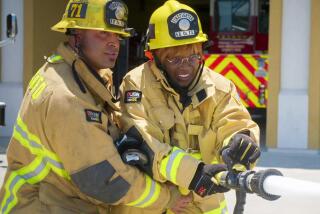This Just In: Reality Check for News at 6
- Share via
“I keep thinking about the real world, the world of the 6 o’clock news,” says filmmaker Ross McElwee, a hint of a wink in his familiar monotone.
Like many of us, of course, Bostonian McElwee is not at all certain that the planet filling the typical newscast is real. Or at least, the world in its full reality.
Actually, “Six O’Clock News,” his personalized “Frontline” film on PBS Tuesday night, is less about news than about the people without whom there would be virtually no news on the air. Not the managers and producers who score the show and choreograph the dance, but the victims of random violence, murder, hurricanes, tornadoes, earthquakes, wildfires and other mayhem whose stories and faces flash briefly, then, after serving their purpose, vanish like blips erased from a radar screen.
McElwee restores and examines some of the blips during a 90-minute documentary that begins in 1989 and spreads to the 1990s. It’s made in the appealing, first-person, introspective, droll style of his previous “Sherman’s March” and “Time Indefinite”--his camera, as always, operating as an extension of himself, his flat commentary giving intimacy to this exercise in self-reflection and self-discovery. And as always, he’s a sucker for minutiae while never losing sight of the panoramic picture.
“Lately the real world seems to be a lot more dangerous than it used to be,” McElwee observes wryly early in his film, which airs, coincidentally, less than a week after Ennis Cosby’s murder refocused and again transfixed the nation on that peril. We’re accustomed to hearing, through the media, of humans brutalizing each other, of lives being randomly squished like insects, of homicide as an abstraction. But if it can happen even to Bill Cosby’s son, an upstanding young man changing a tire on a Mercedes at night in a posh Los Angeles neighborhood inhabited supposedly by the civilized set, well. . . .
In any case, it’s other turmoil that preoccupies McElwee as he watches human dominoes fall, one by one, on the news, sending him on a TV-driven, cross-country odyssey that starts in South Carolina, where he checks in with his close friend, Charleen, who lives in an area devastated by widely televised Hurricane Hugo. McElwee followers will recall Charleen, her modernistic house and sage perceptions from “Time Indefinite.”
“There’s so much that is lucky or unlucky or circumstantial in life, it makes me scared,” says Charleen, whose husband died in a fire that had destroyed her previous home three years earlier.
Then a tragic story he sees on his TV in a Jackson, Miss., motel room has McElwee going off to visit Stephen Im, a prosperous businessman whose wife was murdered during a robbery of her wig store. Despite his material success and outward good cheer, Im confesses that his wife’s murder has shaken his belief in God.
As someone who finds capitalism to be “the state religion of America,” McElwee might be expected to second-guess a God who would allow the intensity of suffering depicted on newscasts. And, indeed, his questions in that regard bind several elements of “Six O’Clock News.”
Yet he hears from an Arizona woman whose mobile home was flattened by a tornado that she’s “grateful to the Lord, because he directs our lives for us.” And despite being horribly injured and trapped nine hours in the parking garage that collapsed during the Northridge earthquake, Salvado Pena tells McElwee that he believes God was testing him: “It is the most beautiful thing I see in myself, to believe more in Him.”
McElwee has a gift for moving easily among diverse sections of America without seeming to trespass. Yet intersections with TV are what evoke his playful sense of humor.
When a TV station hears of the film that McElwee is making and dispatches a reporter and crew to interview him, he feels the pressure to deliver snappy sound bites, but relieves it by taping them retaping their own entry three times to provide “more of a spontaneous feel.” And in the tornado-smashed mobile home park that he visits, he tapes TV crews that have choppered down for quickie interviews with residents, then zoomed back up like transients.
McElwee sees Los Angeles and its entertainment industry through the eyes of a bemused Easterner. Hence his funny encounter on a Santa Monica beach with a crew filming the syndicated “Baywatch.” His own camera rolling, he’s approached by a strange, shabby looking man who asks him if he’s “filming all those naked girls down there.” Then he learns that a uniformed policeman who earlier ordered him away is actually a “Baywatch” actor in cop costume.
In fact, “Six O’Clock News” is built on overlapping realities. It begins with McElwee saying he’s searching for epiphanies that give meaning to the chaos and uncertainty that pour from newscasts. He finds none, but does end on a tone of hope and rebirth in Boston in the company of his 4-year-old son, and also back in South Carolina with Charleen, who celebrates a bit of the life she sees outside her beloved house that somehow stood through the hurricane. “Look,” she says, pointing to a tree. “That’s a bird’s nest.”
* “Six O’Clock News” airs on “Frontline” at 9 p.m. Tuesday on KCET-TV Channel 28.
More to Read
Only good movies
Get the Indie Focus newsletter, Mark Olsen's weekly guide to the world of cinema.
You may occasionally receive promotional content from the Los Angeles Times.










